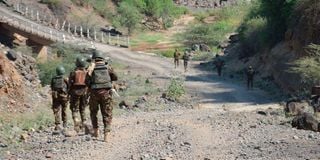KDF should be exempted from taxes

Kenya Defence Forces soldiers on patrol near Kapedo bridge, one of the most volatile areas in the region, on December 9, 2023.
The primary objective of the national security system and organs is to promote and guarantee national security in accordance with the principles of Article 238 (2) of the Constitution. The responsibilities of Kenya Defence Forces (KDF), under Art. 241 (3), are the defence and protection of the sovereignty and territorial integrity of the republic and assisting and cooperating with other authorities in emergencies and disasters.
Over the past several years, KDF missions have been impactful internationally and nationally. The military has taken part in numerous peacekeeping missions around the world. It is currently deployed in Somalia, under Amisom, to help pacify zones earlier held by terrorist groups. Locally, KDF has been instrumental in supporting the police in law enforcement and security operations.
KDF has been instrumental in returning the Kenya Meat Commission to profitability. For the first time in over 60 years, Kisumu port was brought to life by KDF, which carried out major repairs on stalled ships, and enhanced regional trade. Railway lines from Nairobi to central Kenya and Nyanza regions were repaired by KDF engineers, encouraging trade, easing pressure on road transport, generating national income and creating job opportunities.
Soldiers should be exempted from taxation as recognition and appreciation for their service and sacrifices. Military service involves significant personal sacrifice, including high-risk exposure in all facets of training and deployment. Myriad occupational hazards come along with military career.
Ancient Greece often relied on a combination of ideology, social pressure, honour and financial rewards to motivate its soldiers. Its charismatic generals and commanders inspired their troops by leading from the front, sharing risks alongside their soldiers, demonstrating competence and bravery on the battlefield and loyalty among the ranks.
Fast-forward to today. Monetary rewards play a significant role in motivating soldiers. Military units need to maintain a high level of readiness and motivation to respond to emergencies and threats effectively. Tax exemption can serve as incentive to attract individuals to join the military and remain in the service for a longer time.
In Israel, motivation for soldiers and reservists includes tax exemptions—such as tax relief on income earned during active and reserve duty, as well as deductions for expenses related to military service, like transportation and accommodation costs.
Most soldiers and their families in the Third World often face financial challenges, particularly during service and when transitioning to civilian life. Financial worries can distract soldiers from their core duties and affect their operational effectiveness. Tax exemption can help to alleviate that.
Sun Tzu opined that “The general who wins the battle makes many calculations before the battle is fought. The general who loses makes but few calculations beforehand.” He underscored the importance of strategic planning and preparation in motivating and leading military forces to victory.
Dr Lusiola, PhD, is a security, safety and risk consultant. [email protected].





